Products
-

Finned tubular heater
Finned tubular air heating elements are constructed like basic tubular elements with the addition of continuous spiral fins, 4-5 per inch permanently furnace brazed to the sheath. Fins greatly increase surface area and permit faster heat transfer to air, resulting in lower surface element temperatures
-
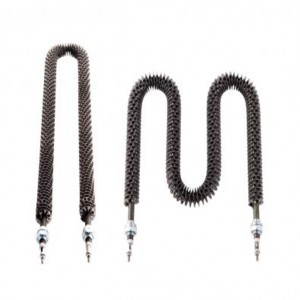
Finned tubular heating elements
Finned tubular air heating elements are constructed like basic tubular elements with the addition of continuous spiral fins, 4-5 per inch permanently furnace brazed to the sheath. Fins greatly increase surface area and permit faster heat transfer to air, resulting in lower surface element temperatures
-
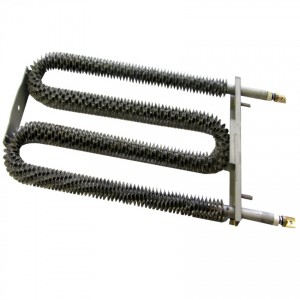
Industrial finned tubular heaters
Finned tubular air heating elements are constructed like basic tubular elements with the addition of continuous spiral fins, 4-5 per inch permanently furnace brazed to the sheath. Fins greatly increase surface area and permit faster heat transfer to air, resulting in lower surface element temperatures
-
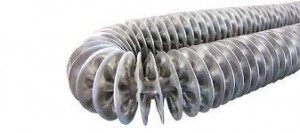
Industrial finned tubular heating elements
Finned tubular elements are safer to operate than open coil heaters as the risk of fire from combustible particles in the flow stream and electrical shock is minimized. Increased service life and less maintenance required due to the rugged finned element construction. Power loading (w/in) of finned tubulars can be matched to any open coil installation.
-

Finned tubular for air duct heater
Finned tubular heaters are superior to tubular heaters since fins greatly increase surface area, permit faster heat transfer to air and permits putting more power in tighter spaces—like forced air ducts, dryers, ovens and load bank resistors resulting in lower element surface temperature. They are made of up of tubular heating elements and are equipped with electro galvanized steel fins. Mechanically bonded continuous fins assure excellent heat transfer and helps prevent fin vibration at high air velocities. As the surface area is increased and heat transfer is improved due to fins, it results in lower sheath temperature and maximizing of element life.
-

Finned tubular heater made in China
Finned tubular heaters are superior to tubular heaters since fins greatly increase surface area, permit faster heat transfer to air and permits putting more power in tighter spaces—like forced air ducts, dryers, ovens and load bank resistors resulting in lower element surface temperature. They are made of up of tubular heating elements and are equipped with electro galvanized steel fins. Mechanically bonded continuous fins assure excellent heat transfer and helps prevent fin vibration at high air velocities. As the surface area is increased and heat transfer is improved due to fins, it results in lower sheath temperature and maximizing of element life.
-

Various types of finned tubular heater
Finned tubular heaters are superior to tubular heaters since fins greatly increase surface area, permit faster heat transfer to air and permits putting more power in tighter spaces—like forced air ducts, dryers, ovens and load bank resistors resulting in lower element surface temperature. They are made of up of tubular heating elements and are equipped with electro galvanized steel fins. Mechanically bonded continuous fins assure excellent heat transfer and helps prevent fin vibration at high air velocities. As the surface area is increased and heat transfer is improved due to fins, it results in lower sheath temperature and maximizing of element life.
-

W Shape finned tubular heating elements
Finned tubular heaters are superior to tubular heaters since fins greatly increase surface area, permit faster heat transfer to air and permits putting more power in tighter spaces—like forced air ducts, dryers, ovens and load bank resistors resulting in lower element surface temperature. They are made of up of tubular heating elements and are equipped with electro galvanized steel fins. Mechanically bonded continuous fins assure excellent heat transfer and helps prevent fin vibration at high air velocities. As the surface area is increased and heat transfer is improved due to fins, it results in lower sheath temperature and maximizing of element life.
-
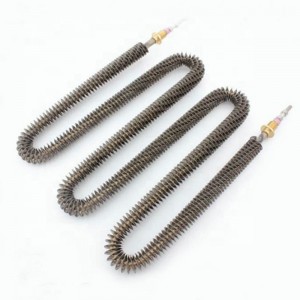
W Shape finned tubular heater
Finned tubular air heating elements are constructed like basic tubular elements with the addition of continuous spiral fins, 4-5 per inch permanently furnace brazed to the sheath. Fins greatly increase surface area and permit faster heat transfer to air, resulting in lower surface element temperatures.
-
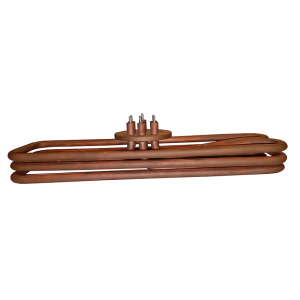
Tubular heater
A tubular industrial heating element is typically used to heat air, gases, or liquids by conduction, convention, and radiant heat. An advantage of tubular heaters is that they can be designed with a variety of cross-sections and path shapes to optimize heating for a specific application.
-
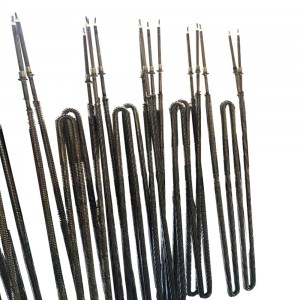
Finned tubular heater manufacturer
Finned tubular air heating elements are constructed like basic tubular elements with the addition of continuous spiral fins, 4-5 per inch permanently furnace brazed to the sheath. Fins greatly increase surface area and permit faster heat transfer to air, resulting in lower surface element temperatures.
-

Ribbed tubular heater
Ribbed tubular heaters are superior to tubular heaters since fins greatly increase surface area, permit faster heat transfer to air and permits putting more power in tighter spaces—like forced air ducts, dryers, ovens and load bank resistors resulting in lower element surface temperature. They are made of up of tubular heating elements and are equipped with electro galvanized steel fins. Mechanically bonded continuous fins assure excellent heat transfer and helps prevent fin vibration at high air velocities. As the surface area is increased and heat transfer is improved due to fins, it results in lower sheath temperature and maximizing of element life.
